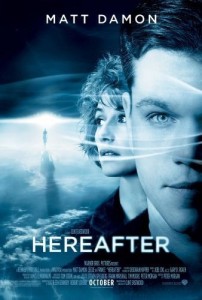For a subject as potentially riveting as the afterlife, it’s startling how Clint Eastwood’s latest film Hereafter manages to be so insipid.
After a string o f films that broach religious and redemptive themes, I must admit a degree of expectation regarding the director’s latest. Hereafter tells parallel stories about three people affected by death in different ways, searching for some sort of resolution regarding a possible afterlife. However, the answers that Eastwood provides are the stuff of postmodern mush.
f films that broach religious and redemptive themes, I must admit a degree of expectation regarding the director’s latest. Hereafter tells parallel stories about three people affected by death in different ways, searching for some sort of resolution regarding a possible afterlife. However, the answers that Eastwood provides are the stuff of postmodern mush.
Matt Damon portrays a conflicted, and remarkably accurate psychic with a hotline to heaven… or at least some foggy netherworldish waiting room. His words, at the end of the movie trailer, are intended to not only comfort the anguished souls that seek him for guidance, but provide a glimpse into Eastwood’s going theory. Says Damon character, “If you’re worried about being on your own, don’t be — you’re not.”
But if that’s supposed to produce hope, it doesn’t. Why? If Hereafter is any indication, apparently we’re being watched by shadowy figures milling about in a gauzy haze. Who’s there, how they got there, what’s going on there, and will they remain there — you know, our biggest existential questions — are all left unanswered. And this is supposed to be… inspirational?
From The Boston Globe article entitled “Eastwood: Still Here, and ‘Hereafter’”
Eastwood was attracted to “Hereafter’’ because it deals with the afterlife in a spiritual manner without turning religious. He attended a variety of churches, mostly Protestant, as a boy but gave up on it early on, disliking the wrathful tone that was preached.
“I couldn’t believe that God would be a great sadist in the sky, getting pleasure out of, ‘If you screw up, I’m going to bust you, boy,’ ’’ Eastwood said. “That’s a way of keeping people in line, I guess.’’
He does find Buddhism attractive, “because they don’t seem to be as mean-spirited, and their idea of God is sort of a heavyset guy who’s got a smile on his face, and I thought, hey, that’s nice,’’ he said.
“Hereafter’’ has no easy answers about whether there’s an afterlife, and the director won’t speculate. (emphasis mine)
The code words in that review are “Spiritual but not religious.” In a recent post on that subject, I decoded that popular phrase this way: “…when someone tells you, ‘It’s not about being religious, it’s about being spiritual,’ what they’re really saying is ‘Being ‘spiritual’ means whatever the heck I want it to mean.'” Turns out that what Eastwood “means” about the hereafter is whatever the heck he wants it to mean.
From the Globe piece, the director summarizes:
“I don’t know what I think about [the afterlife]. I probably tend to think, you’re here for the time you’re here, and you should do the best you can for the time you’re here, and appreciate it and move on. That’s rather simplistic, but that’s where I come out.’’
“[Y]ou’re here for the time you’re here.” Check. “[D]o the best you can for the time you’re here.” Check. “[A]ppreciate it and move on.” Check.
Now that that’s solved…
Really, I don’t expect films to be didactic about theology, much less a subject so personalized and complex as death. Yet Hereafter not only has “no easy answers,” it has NO answers. Just the typical blather about “be good,” “we’ll all find our way,” and “everything will be all right.”
Yawn.
In this interview with Katie Couric, when asked what he believes about the afterlife, Eastwood answers, “I haven’t the foggiest.” Well, Clint, if Hereafter is any indication, it shows.














Good review, Mike. You described what the trailer indicated. The typical non-committal response. Not a clue.
Thanks for this.
Too bad. I hate to hear that people think the God of the Bible is a sadist. It really hurts me. What a huge misunderstanding on how much God loves us and longs to clothe us in righteousness.
Great review Mike. It is sad that Clint has not used his remarkable intellect to search out and study the great religions. He does not seemingly understand Buddhism or Christianity. I always encourage people to take a course on World Religions or Comparative Religion so that they can have a basis for making distinctions. God Bless and keep up the good work.